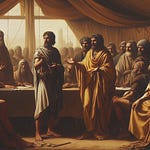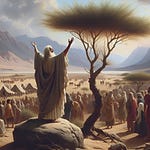Chapter Notes
Have you ever known someone to cling to something harmful, even as its consequences brought increasing devastation?
In Exodus 9, Pharaoh’s stubborn resistance to God’s commands escalates the severity of the plagues, vividly illustrating the cost of defiance.
Commentary
Having considered the first four plagues, Exodus 9 records the next three.
vv. 1–7 - God sends Moses back to Pharaoh with the same command: Let my people go, that they may serve me. Pharaoh refuses, and the consequences follow. A deadly plague strikes Egypt’s livestock—cattle, horses, donkeys, camels, oxen, sheep—essential to Egypt’s wealth and survival. Yet, in Goshen, where Israel dwells, not a single animal dies. The distinction is unmistakable. God’s hand is evident. Pharaoh even investigates the matter himself and finds the report to be true. Yet, despite the overwhelming evidence, his heart remains hardened.
vv. 8–12 - This time, there’s no warning. No chance to prepare. At God’s command, Moses takes handfuls of ashes and tosses them into the sky. The dust spreads, and painful boils break out on both man and beast. The suffering is immediate. The magicians—once bold in their opposition—are now powerless. Covered in sores, they cannot even stand before Moses. The message is clear: Egypt’s gods are silent. Egypt’s priests are helpless. Their false religion crumbles before the living God.
vv. 13–35 - The next morning, Moses delivers another message from the Lord. But this time, the purpose is made explicit: That thou mayest know that there is none like me in all the earth (v. 14). Pharaoh has resisted. But God has been patient. That patience is about to give way to greater judgment. A hailstorm is coming—unlike anything Egypt has ever seen. But there is an opportunity for refuge. Whoever fears the Lord can bring their servants and livestock inside. Some listen. They act quickly, taking shelter. Others scoff and leave everything in the open. Then it begins. The heavens roar, and hail rains down with a vengeance. Crops are ruined. Trees are shattered. Livestock and servants left exposed perish in the storm. But in Goshen, there is peace. Not a single stone falls. Pharaoh is shaken. He calls for Moses. I have sinned this time, he confesses. The LORD is righteous, and I and my people are wicked (v. 27). He pleads for the plague to end. Moses prays. The storm ceases. But as soon as the sky clears, Pharaoh’s heart hardens again. His words were hollow. His repentance was false. He wanted relief, not righteousness.
Application
God will confront human pride. Pharaoh had power, but no control. He resisted God’s will at every turn, yet he could do nothing to stop what was coming. His pride led him deeper into judgment. And how often do we do the same? We hold tightly to our own way. We ignore the warnings. We refuse to yield. But God resisteth the proud, and giveth grace unto the humble (James 4:6). Are there areas in your life where pride keeps you from full surrender? Do not wait for God to bring you low. Humble yourself now.
Superficial sorrow changes nothing. Pharaoh’s words sounded sincere. He admitted his sin. He acknowledged God’s righteousness. He even asked for prayer. But when the crisis passed, he went right back to rebellion. How many people do the same? They cry out to God when life gets hard but forget Him when things improve. They want relief, not true change. But godly sorrow worketh repentance to salvation… but the sorrow of the world worketh death (2 Corinthians 7:10). Does your confession come from a heart transformed by grace? Or is it just a desire to escape discomfort?
All sickness is ordained by God and should lead us to repentance. The boils, the hail, the devastation—each plague was a wake-up call. But Pharaoh refused to listen. Instead of turning to God, he hardened his heart. Not every hardship is punishment. But every trial is an opportunity. A time to examine your soul. A time to seek the Lord. When suffering comes, do you allow it to draw you nearer to God? Or are you just waiting for it to pass?
What often blesses can become an instrument of judgment. Rain is usually a sign of God’s kindness. But in Egypt, it became a tool of destruction. The same is true in life. The very things God gives—health, wealth, talents, even His Word—can either bless or condemn. To the one we are the savour of death unto death; and to the other the savour of life unto life (2 Corinthians 2:16). How do you respond to God’s blessings? With gratitude and obedience? Or indifference and neglect?
There is a distinction between those in covenant with God and those outside it. Egypt suffered. Israel did not. God made a distinction. He still does today. That doesn’t mean believers never face hardship, but it does mean we rest in His promises. His judgments strike differently. His people have a refuge. He shall cover thee with his feathers, and under his wings shalt thou trust (Psalm 91:4). Do you live in the confidence of His care?
Christ is our refuge in judgment. The hailstorm left no middle ground. Those who feared the Lord found shelter. Those who ignored the warning suffered. The gospel is the same. Judgment is coming, but there is a place of refuge. Christ took the storm of God’s wrath so that we wouldn’t have to. God hath not appointed us to wrath, but to obtain salvation by our Lord Jesus Christ (1 Thessalonians 5:9). Have you fled to Christ? Or are you standing in the open, ignoring the warning? Pharaoh played games with God’s mercy. He thought he could resist. He thought he could wait. He thought he could bend God to his will. He was wrong. Learn from his failure. Do not harden your heart. Run to Christ. Find grace.
“But of what avail and of what value was his confession? The repentance that was born in the storm died in the calm. That repentance of his that was begotten amidst the thunder and the lightning ceased as soon as all was hushed in quiet.” — Charles Spurgeon











